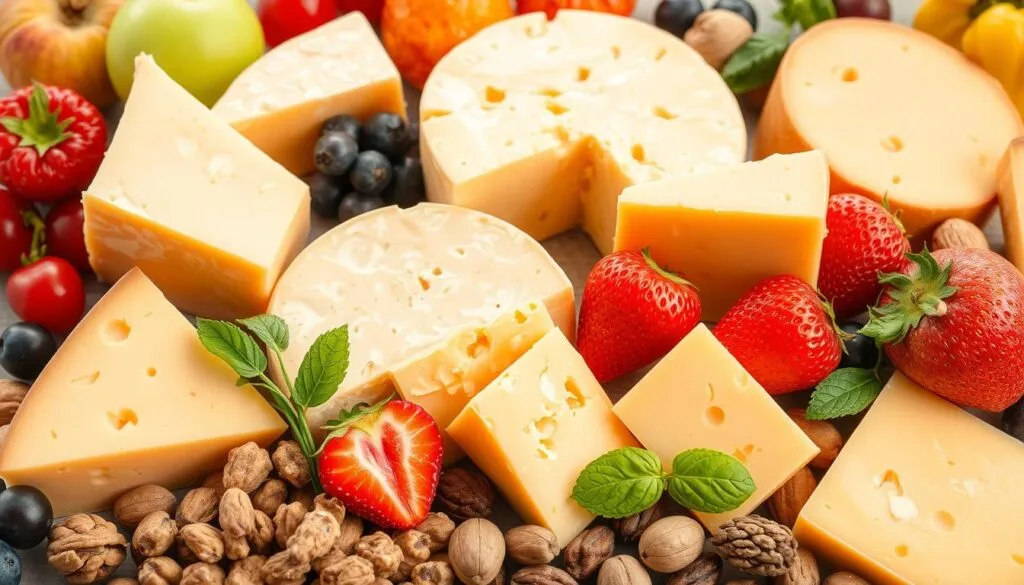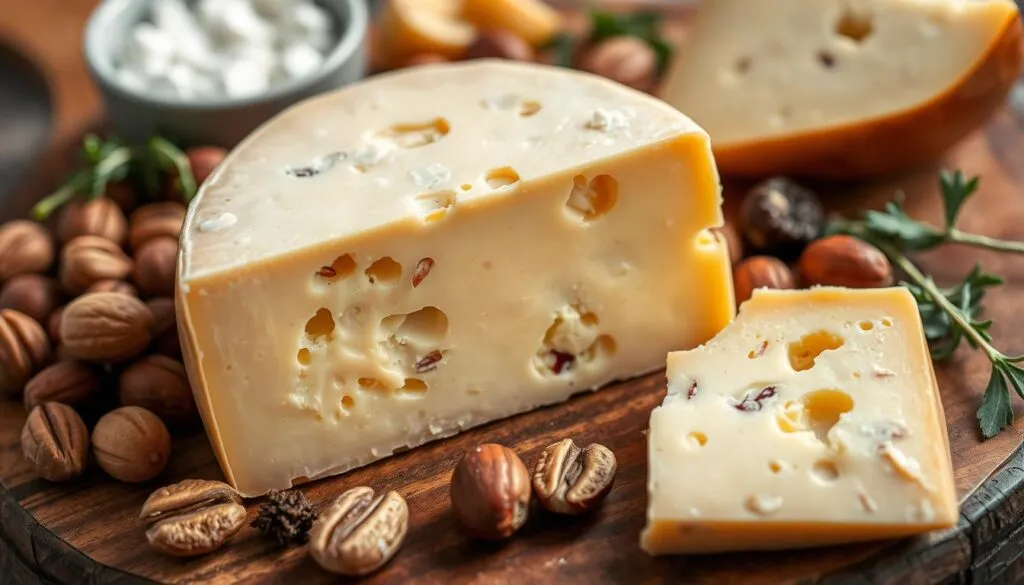Gouda cheese is a favorite for its creamy taste and health perks. You might ask, is Gouda cheese good for you? It’s packed with protein and calcium, making it a nutritious choice. But, it also has saturated fat and sodium, which might be a worry for some.
We’ll dive into Gouda’s health benefits and how to eat it healthily. This way, you can enjoy its rich flavor without overdoing it.
Gouda cheese is a treasure trove of nutrients like protein and calcium. It’s a fantastic addition to a healthy diet when eaten in the right amounts. If you’re searching for a tasty, nutritious cheese, Gouda is a great pick. So, is Gouda cheese healthy? Yes, it is, when part of a balanced diet. Just remember to keep it in moderation to avoid the downsides like high fat and sodium.
Exploring Gouda cheese opens up a world of health benefits. It’s not just about its protein and calcium; it’s also a tasty snack. So, enjoy the creamy taste of Gouda, knowing it’s good for you. Its health benefits make it a favorite among those who care about their diet.
Understanding Gouda Cheese: A Nutritional Overview
Gouda cheese is loved for its creamy taste and health perks. It’s packed with calcium, about 200 mg per ounce. This meets about 20% of what adults need daily. It also has a lot of protein, about 7 grams per ounce, helping muscles and keeping you full.
The fat in Gouda cheese is about 22 grams per ounce, with 14 grams of saturated fats. But, it’s also rich in Vitamin B12, giving about 0.4 µg per ounce. This is about 17% of what adults need. Plus, it has Vitamin K2, up to 76 µg per ounce, which is great for bones.

| Cheese Variety | Calories (per 25g serving) | Protein (per 25g serving) | Fat (per 25g serving) | Calcium (per 25g serving) |
|---|---|---|---|---|
| Gouda | 94 | 6.3g | 7.7g | 193mg |
| Edam | 85 | 6.7g | 6.5g | 199mg |
| Goat’s cheese | 80 | 5.3g | 6.5g | 33mg |
In short, Gouda cheese is a great choice for a healthy diet. Knowing its nutritional value helps us make better choices for our health.
The Complete Protein Profile of Gouda Cheese
Gouda cheese is a great source of high-quality protein, with 7.1 grams per ounce. It’s perfect for adding to a balanced diet, helping those who want more protein. The protein in gouda cheese includes all the essential amino acids we need.
Protein is key for our bodies. It helps build and fix tissues like muscles, bones, and skin. Gouda cheese can help meet our daily protein needs. It’s a great choice for boosting protein in our diets.

The protein in gouda cheese has many benefits. It’s made of high-quality protein and essential amino acids. It supports our body’s tissues and helps meet our daily protein needs.
With its unique protein profile, gouda cheese is a great addition to a balanced diet. It offers many health benefits and supports our overall well-being.
Essential Vitamins and Minerals in Gouda
Gouda cheese is packed with important vitamins and minerals. It has a lot of calcium, which is key for strong bones. With about 20% of the daily calcium needed in one serving, it’s great for your diet.
Calcium in gouda cheese helps keep bones healthy. Studies show that eating foods high in calcium can make bones denser.
Gouda cheese also has protein, vitamin B12, and phosphorus. These nutrients make it a top choice for boosting health and wellness.

| Nutrient | Amount per serving | Daily Value (%) |
|---|---|---|
| Calcium | 200 mg | 20 |
| Protein | 7 g | 14 |
| Vitamin B12 | 1.5 mcg | 25 |
| Phosphorus | 150 mg | 15 |
In summary, gouda cheese is a tasty and healthy part of a balanced diet. It offers key vitamins and minerals, like calcium, to support your health.
is Gouda cheese good for you?
Looking into whether Gouda cheese is healthy, we need to check its nutrition and benefits. A 1-ounce serving has 101 calories, 7.1 grams of protein, and 7.8 grams of fat. Of this, 5 grams are saturated fat.
Gouda cheese is packed with calcium, giving 198 milligrams per ounce. This is 20% of what we need daily. It also has 155 milligrams of phosphorus, 1.11 milligrams of zinc, and 0.4 micrograms of vitamin B12 per ounce. Despite its saturated fat, it’s a good source of protein and nutrients.
Here is a summary of the nutritional content of Gouda cheese:
| Nutrient | Amount per ounce |
|---|---|
| Calories | 101 |
| Protein | 7.1g |
| Total Fat | 7.8g |
| Saturated Fat | 5g |
| Calcium | 198mg |
So, is Gouda cheese healthy? It depends on your diet and what you like. It has a lot of saturated fat but also important nutrients. Eating it in moderation can make it part of a healthy diet.

Gouda’s Role in Weight Management
Gouda cheese can be a great addition to your diet for weight loss. It’s high in protein, which helps you feel full longer. A 1-ounce serving has 7.06 grams of protein, helping control hunger.
Gouda cheese also has almost no carbs, making it good for keto diets. Its low glycemic index helps keep blood sugar balanced, which is key for losing weight.
To get the most out of gouda cheese for weight loss, watch your portions. A 1-ounce serving has about 101 calories. Here are some ways to add gouda cheese to your diet:
- Choose younger gouda varieties, which tend to have a lower calorie count
- Pair gouda cheese with fruits or vegetables for a satisfying snack
- Use gouda cheese as a topping for salads or soups to add protein and flavor
By adding gouda cheese to your diet and controlling portions, you can support your weight loss. Its high protein and low carbs make it a useful tool for managing weight.
Heart Health Considerations When Eating Gouda
Gouda cheese has both good and bad points for heart health. It’s high in saturated fat, which can raise heart disease risk. But, it’s also packed with protein and calcium, which are heart-friendly.
Eating foods rich in calcium, like gouda, can help lower blood pressure. This can reduce heart disease risk. Some studies also link cheese to lower risks of type 2 diabetes and heart failure.
Here are some tips for eating gouda cheese while thinking about heart health:
- Eat gouda cheese in moderation, as part of a balanced diet.
- Choose lower-fat gouda cheese to cut down on saturated fat.
- Pair gouda with fruits and veggies to make your diet more balanced.
To make smart choices about gouda cheese and heart health, check out this table:
| Cheese Type | Saturated Fat Content | Calcium Content |
|---|---|---|
| Gouda Cheese | 5-6 grams per ounce | 20% of the daily value per ounce |
| Cheddar Cheese | 5-6 grams per ounce | 20% of the daily value per ounce |
| Cottage Cheese | 2.7 grams per 1/2 cup | 10% of the daily value per 1/2 cup |
Digestive Benefits and Considerations
Looking at the digestive benefits of gouda cheese, we find its probiotics. Probiotics are good bacteria and yeast that help your gut. Aged gouda has probiotics like Lactococcus lactis and Lactobacillus plantarum. These can make it through the cheese aging and your digestion.
Gouda cheese is packed with nutrients. It has about 101 calories per ounce, 7.8 grams of fat, and 15% of your daily calcium. It also has less lactose, which is good for those with lactose intolerance.
The table below shows the nutritional values of different cheeses, including gouda:
| Cheese Type | Calories per ounce | Fat per ounce | Calcium per ounce |
|---|---|---|---|
| Gouda | 101 | 7.8g | 15% DV |
| Cheddar | 114 | 9.4g | 15% DV |
| Brie | 95 | 7.9g | 4% DV |
Probiotics in Aged Gouda
Regular eating of Lactobacillus plantarum in aged gouda boosts your immune system. It increases antibodies and cytokines, key to fighting off infections.
Lactose Content and Digestibility
Gouda cheese is easier to digest than many dairy products. This is because it has less lactose, which is good for those with lactose intolerance.
Comparing Gouda to Other Cheese Varieties
Choosing the best gouda cheese for health means looking at its nutrition compared to others. Gouda has 94 kcals, 6.3g protein, 7.7g fat, and 193mg calcium in a 25g serving. Edam, another popular cheese, has similar values but slightly less calories.
Here is a table comparing the nutritional values of different cheese varieties:
| Cheese Variety | Calories (kcal) | Protein (g) | Fat (g) | Calcium (mg) |
|---|---|---|---|---|
| Gouda | 94 | 6.3 | 7.7 | 193 |
| Edam | 85 | 6.7 | 6.5 | 199 |
| Goat’s cheese | 80 | 5.3 | 6.5 | 33 |
| Parmesan | 104 | 9.1 | 7.4 | 256 |
Gouda stands out for its high calcium and balanced nutrition. It’s a tasty choice that’s good for your health. Adding Gouda to your diet can bring many benefits.
Best Ways to Include Gouda in Your Diet
Gouda cheese is great for many dishes, like gouda mac and cheese. It tastes rich and creamy and is good for you. You can enjoy it with sandwiches or crackers for a quick snack.
For a bigger meal, try gouda mac and cheese. It uses whole milk and bean-based macaroni. This dish is tasty and full of protein, calcium, and vitamins. It’s perfect for a weeknight dinner, ready in 15 minutes for 4 servings.
- Savory Gouda and Spinach Pizza
- Smoked Gouda & Roast Beef Pinwheels
- Spinach & Gouda Stuffed Pork Cutlets
- Butternut-Gouda Pot Stickers
These recipes show how versatile gouda cheese is. They offer many ways to add gouda to your meals.
| Recipe | Total Time | Servings | Calories per Serving |
|---|---|---|---|
| Gouda Mac and Cheese | 20 minutes | 4 | 451 |
| Savory Gouda and Spinach Pizza | 30 minutes | 10 | 288 |
| Smoked Gouda & Roast Beef Pinwheels | 35 minutes | 4 dozen | 71 |
With these ideas, you can easily add gouda to your diet. Enjoy its health benefits with classic gouda mac and cheese or try something new.
Conclusion: Making Informed Choices About Gouda Cheese
Gouda cheese is a versatile and nutritious dairy product. It can be a great addition to a balanced diet. It has a moderate amount of saturated fat and sodium.
But, it also has protein, calcium, and vitamin content. This makes it a good choice in moderation. When picking Gouda cheese, choose reduced-fat or low-sodium types to lessen health risks.
The choice to add Gouda cheese to your diet depends on your needs and likes. Knowing the health benefits and nutritional profile of this cheese helps you make smart choices. Enjoy the rich, creamy taste of Gouda as part of a healthy diet that fits your health goals.
FAQ
What makes Gouda cheese unique?
Gouda cheese stands out because of its unique taste and texture. The way it’s made, including aging and specific cultures, gives it a special flavor.
What is the basic nutritional profile of Gouda cheese?
Gouda cheese is packed with protein, calcium, and vitamins. It also has saturated fat and sodium, so it’s important to eat it in moderation.
How does the protein content of Gouda cheese compare to other cheeses?
Gouda cheese has a lot of protein, making it a great choice for those looking for a high-quality protein source. It has more protein than many other cheeses.
What are the key vitamins and minerals found in Gouda cheese?
Gouda cheese is rich in calcium, which is good for bones. It also has vitamin B12, phosphorus, zinc, and sodium.
What are the health benefits and drawbacks of consuming Gouda cheese?
Gouda cheese is good for you because it’s high in protein and calcium. But, it has a lot of saturated fat. Eating it in moderation is best.
How can Gouda cheese be beneficial for weight management?
The protein in Gouda cheese can help you feel full. This might help with weight management. Just remember to control your portions and eat it as part of a balanced diet.
Does Gouda cheese have any heart health implications?
Gouda cheese has a lot of saturated fat, which might not be good for your heart. But, it also has protein and calcium that could help. It’s all about finding the right balance for your health.
What are the digestive benefits and considerations of Gouda cheese?
Aged Gouda cheese might have probiotics that help your digestion. It also has less lactose, which is good for people with lactose intolerance.
How does Gouda cheese compare to other cheese varieties in terms of health?
Gouda cheese has a unique nutritional profile compared to other cheeses. Knowing the differences can help you make better choices for your diet.
How can Gouda cheese be incorporated into a healthy diet?
Gouda cheese can be used in many dishes, like mac and cheese. Just remember to eat it in moderation and as part of a balanced diet.

